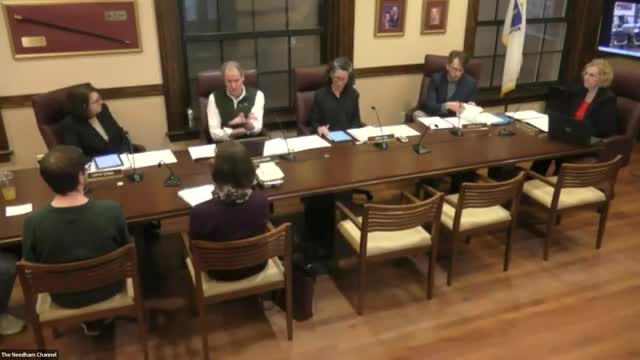Needham Select Board closes public hearing on proposed black-plastic ban and ‘Skip the Stuff’ warrant articles
Get AI-powered insights, summaries, and transcripts
Subscribe
Summary
The Town of Needham Select Board closed a public hearing March 11 on two citizen‑petitioned warrant articles — a proposed ban on black single‑use food containers and a ‘Skip the Stuff’ request‑only policy for takeout items — and agreed to include the petitions in the draft warrant for a later vote.
The Town of Needham Select Board closed a March 11 public hearing on two citizen‑petitioned warrant articles proposing (1) a ban on black single‑use food containers and (2) a “Skip the Stuff” policy to require customers to request condiments and utensils for takeout. The board voted to close the hearing and include the petition articles in the draft warrant; the board said it will take a formal position when the warrant is closed and the item returns for a vote.
Supporters said health and waste concerns motivated the proposals. Petitioner Kathy Reyes, who gave her address as 84 Wildwood Drive, told the board “the reason that we are looking to ban black plastic is twofold. 1, it contains, flame retardants that ... have been found to reduce children’s IQs, boost cancer rates, and contribute to thyroid disease.” Reyes also told the board black food containers are difficult to recover at recycling facilities and often go to landfill or incineration, a downstream cost she said affects Needham.
The Charles River Chamber delivered mixed feedback. Maxwell (Max) Wolf of the Charles River Chamber said the chamber’s outreach to restaurants found concern about regulatory timing and supply‑chain uncertainty and that “9 out of the 14 respondents to that survey anticipate cost increases with containers.” Wolf said that, because restaurants are already struggling with supply and price volatility, the chamber does not support moving forward with a black‑plastic ban at this time but supports the Skip the Stuff concept.
Local restaurateur Jay Spencer, owner of French Press Bake Brewing Cafe, told the board his business has long used alternatives and that regulation is a state responsibility: “If you wanna have the maximum amount of impact, nickel and dime on the community is not gonna make a difference.” Spencer said independent restaurants that buy from cash‑and‑carry suppliers may face different availability and cost constraints than larger groups that can use national distributors.
Committee and municipal examples were cited. Petitioners referenced Newton’s ordinance and reported that some Newton restaurants found comparable replacement products and manageable supply issues after a year living with the ban; an organizer from Green Newton, Alan Gordon, encouraged Needham to consider stronger language. Several board members and other speakers pressed for clearer definitions — for example, whether the proposed ban would cover trays, sushi boats and small condiment cups — and asked staff to return with clarified language.
Board action and next steps
Select Board members closed the public hearing at the meeting and agreed to include the petitioned warrant articles in the draft warrant. Board members said they will have an opportunity to decide whether to sponsor or remove the articles after the warrant is finalized; the board discussed a timeline tied to closing the warrant at a future meeting. No ban or ordinance was adopted on March 11.
Why it matters
Proposals that limit single‑use foodware can affect public health debates, municipal recycling and local business costs. Needham’s discussion mirrored debates in other Bay State communities about near‑term supply challenges for independent restaurants, evidence of chemical exposure from certain feedstocks, and whether policy should be set locally or by the state.
What supporters asked for
Reyes and other petitioners asked the board to advance both items to the warrant and to consider broad wording that would limit black plastic foodware because of health and recycling concerns. Some business groups asked for carve‑outs (for sub‑4‑ounce items or specialized trays) and more time for outreach.
What opponents asked for
Several local restaurant owners opposed a local ban on the grounds of supply, cost and local control. The Charles River Chamber urged caution given supply‑chain uncertainty. Opponents said state action would be a better venue for broad manufacturer and recycling changes.
Outlook
The Select Board closed the hearing; the articles remain in the draft warrant and will return for a later vote on the town’s meeting schedule. The board requested clearer draft language, more supply‑cost data, and additional outreach to restaurants and waste‑management stakeholders before taking a formal position.
